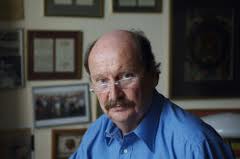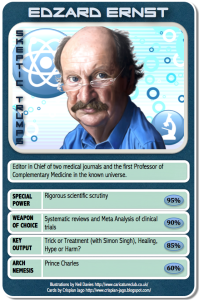Originally published Sunday, Sept. 15, 2013
The WHO is one of the most respected organisations in all of health care. It therefore might come as a surprise that it features in my series of institutions contributing to the ‘sea of misinformation’ in the area of alternative medicine. I have deliberately selected the WHO from many other organisations engaging in similarly misleading activities in order to show that even the most respectable bodies can have little enclaves of quackery hidden in their midst.
In 2006, the WHO invited Prince Charles to elaborate on his most bizarre concepts in relation to ‘integrated medicine’. He told the World Health Assembly in Geneva: “The proper mix of proven complementary, traditional and modern remedies, which emphasises the active participation of the patient, can help to create a powerful healing force in the world…Many of today’s complementary therapies are rooted in ancient traditions that intuitively understood the need to maintain balance and harmony with our minds, bodies and the natural world…Much of this knowledge, often based on oral traditions, is sadly being lost, yet orthodox medicine has so much to learn from it.” He urged countries across the globe to improve the health of their populations through a more integrated approach to health care. What he failed to mention is the fact that integrating disproven therapies into our clinical routine, as proponents of ‘integrated medicine’ demonstrably do, will not render medicine better or more compassionate but worse and less evidence-based. Or as my more brash US friends often point out: adding cow pie to apple pie is no improvement.
For many years during the early 2000s, the WHO had also been working on a document that would have promoted homeopathy worldwide. They had convened a panel of ‘experts’ including the Queen’s homeopath Peter Fisher. They advocated using this disproven treatment for potentially deadly diseases such as malaria, childhood diarrhoea, or TB as an alternative to conventional medicine. I had been invited to comment on a draft version of this document, but judging from the second draft, my criticism had been totally ignored. Fortunately, the publication of this disastrous advice could be stopped through a concerted initiative of concerned scientists who protested and pointed out that the implementation of this nonsense would kill millions.
In 2003, the WHO had already published a very similar report: a long consensus document on acupuncture. It includes the following list of diseases, symptoms or conditions for which acupuncture has been proved-through controlled trials-to be an effective treatment:
Adverse reactions to radiotherapy and/or chemotherapy
Allergic rhinitis (including hay fever)
Biliary colic
Depression (including depressive neurosis and depression following stroke)
Dysentery, acute bacillary
Dysmenorrhoea, primary
Epigastralgia, acute (in peptic ulcer, acute and chronic gastritis, and gastrospasm)
Facial pain (including craniomandibular disorders)
Headache
Hypertension, essential
Hypotension, primary
Induction of labour
Knee pain
Leukopenia
Low back pain
Malposition of fetus, correction of
Morning sickness
Nausea and vomiting
Neck pain
Pain in dentistry (including dental pain and temporomandibular dysfunction)
Periarthritis of shoulder
Postoperative pain
Renal colic
Rheumatoid arthritis
Sciatica
Sprain
If we compare these claims to the reliable evidence on the subject, we find that the vast majority of these indications is not supported by sound data (a fuller discussion on the WHO report and its history can be found in our book TRICK OR TREATMENT…). So, how can any organisation as well-respected globally as the WHO arrive at such outrageously misleading conclusions? The recipe for achieving this is relatively simple and time-tested by many similarly reputable institutions:
- One convenes a panel of ‘experts’ all or most of whom have a known preconceived opinion in the direction on has decided to go.
- One allows this panel to work out their own methodology for arriving at the conclusion they desire.
- One encourages cherry-picking of the data.
- One omits a meaningful evaluation of the quality of the reviewed studies.
- One prevents any type of critical assessment of the report such as peer-review by sceptics.
- If criticism does emerge nevertheless, one ignores it.
I should stress again that the WHO is, on the whole, a very good and useful organisation. This is precisely why I chose it for this post. As long as it is big enough, ANY such institution is likely to contain a little niche where woo and anti-science flourishes. There are far too many examples to mention, e.g. NICE, the NIH, UK and other governments. And this is the reason we must be watchful. It is all to human to assume that information is reliable simply because it originates from an authoritative source; the appeal to authority is appealing, of course, but it also is fallacious!
________________________________________________________________________________________________
Edzard Ernst MD, PhD, FMedSci, FSB, FRCP, FRCPEd
Emeritus Professor, Exeter University
 Dr. Ernst qualified as a physician in Germany in 1978 where he also completed his MD and PhD theses. He received hands-on training in acupuncture, autogenic training, herbalism, homoeopathy, massage therapy and spinal manipulation.
Dr. Ernst qualified as a physician in Germany in 1978 where he also completed his MD and PhD theses. He received hands-on training in acupuncture, autogenic training, herbalism, homoeopathy, massage therapy and spinal manipulation.
Later, he became Professor in Physical Medicine and Rehabilitation (PMR) at Hannover Medical School and Head of the PMR Department at the University of Vienna. In 1993, he moved to the UK and became Chair in Complementary Medicine at the University of Exeter. He is founder/Editor-in-Chief of two medical journals (Perfusion and Focus on Alternative and Complementary Therapies).
He has published 48 books and more than 1000 articles in the peer-reviewed medical literature. His work has been awarded with 14 scientific prizes. In 1999, he took British nationality.
His research focussed on the critical evaluation of all aspects of alternative medicine. Unlike most of his colleagues, he does not aim to promote a particular therapy. His goal is to provide objective evidence and reliable information. It is fair to say that this ambition did not endear him to many quasi-religious believers in alternative medicine.
Healthy Skepticism is republishing selections from Dr. Ernst’s blog with permission. Please visit his website at http://edzardernst.com


